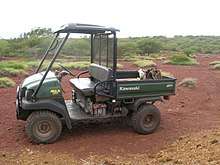Side-by-side (vehicle)
The side-by-side (SxS or SSV), also called a utility terrain vehicle (UTV) or recreational off-highway vehicle (ROV),[1] is a small, 2- to 6-person four-wheel drive off-road vehicle.
Definition and standards
There are two standards published by the American National Standards Institute (ANSI) for side-by-sides. ANSI/OPEI B71.9-2016 sets standards for multipurpose off-highway utility vehicles (MOHUV) specifically intended for utility use which are intended to transport persons and cargo, have a non-straddle seat, are designed to travel on four or more wheels, use a steering wheel and pedals for controls, have a top speed of at least 25 mph (40.2 km/h), are 2030 mm (80 in) or less in overall width, have a gross vehicle weight rating (GVWR) of no more than 1814 kg (4000 lb), and with a minimum cargo capacity of 159 kg (350 lb).[2] ANSI/ROHVA 1-2016 sets standards for recreational off-highway vehicles as having speed capability greater than 30 MPH (48 km/h), GVWR no greater than 1700 kg (3750 lbs), and engine displacement equal to or less than 1,000cc (61 cubic inches) for gasoline fueled engines.[3]
Safety
Side-by-sides come factory-equipped with a rollover protection structure. Many of the vehicles also come equipped with hard tops, windshields, and even cab enclosures. Many follow safety standards including "visual seat belt usage reminders; leg/foot barriers; shoulder/hip barriers; and arm/hand barriers to restrict occupant egress and excursion from the vehicle during a rollover event." These are voluntary standards under American National Standard for recreational off-highway vehicles, ANSI/ROHVA 1-2016, though the United States Consumer Product Safety Commission (CPSC) has proposed making them mandatory.
CPSC stated in 2009 that "The vehicles may exhibit inadequate lateral stability, undesirable steering characteristics, and inadequate occupant protection during a rollover crash". According to the CPSC between 2003 and August 2009 116 deaths occurred in ROV/UTV accidents.[4]
Motorsports
Since the 2017 Dakar Rally the SSV category vehicles compete in a separate class, which is defined as four-wheel side-by-side vehicles with 1000 cc maximum displacement.[5] Previously, they were classified in the Cars T3.3 subclass.
Other off-road racing series include side-by-side classes, such as the Lucas Oil Off Road Racing Series, TORC: The Off-Road Championship, SCORE International, Best in the Desert, and Grand National Cross Country. Monster Jam arena tours include an event where monster truck drivers race Polaris RZRs across an obstacle course.
Manufacturers
Notable manufacturers of UTVs include:
- Arctic Cat
- Argo UTV
- Bobcat
- Bush Hog
- Can Am
- Carter Brothers
- Case IH
- Caterpillar Inc.
- Club Car
- Cub Cadet
- Gravely
- Honda
- Husqvarna
- John Deere
- Kawasaki
- Kioti
- Kubota
- KYMCO
- Mahindra
- Nikola Motor Company
- New Holland
- Polaris
- Suzuki
- Textron Specialized Vehicles
- Taiwan Golden Bee
- Tomcar
- Toro
- Yamaha
References
| Wikimedia Commons has media related to Side by Side vehicles. |
- "Recreational Off-Highway Vehicles". U.S. Consumer Product Safety Commission. 4 May 2011.
- "American National Standard for Multipurpose Off-Highway Utility Vehicles" (PDF). ANSI. Retrieved January 10, 2020.
- "ANSI/ROHVA 1-2016" (PDF). Retrieved January 10, 2020.
- Melanie Trottman (9 October 2009). "CPSC Staff Calls for Mandatory ROV Standards". Wall Street Journal.
- "2017 Stage 1 Live Feed". dakar.com. The Dakar. Retrieved 7 January 2017.
